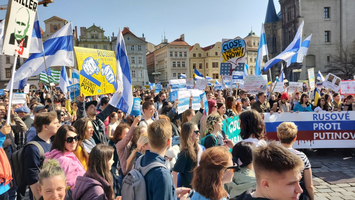
The Western response to the Russian invasion of Ukraine is widely seen as a sign of a reinvigorated alliance of democracies against authoritarianism. Even historically anti-war publications like the Guardian speak volubly about the West’s heroic “defense of liberty.” Raising concerns about petty issues like a potential nuclear war over Ukraine leads one now to be dismissed as a Putinist stooge, both by those who habitually back wars, like neoconservatives and defense contractors, and those who almost always oppose them, or used to, anyway.
Amidst the relentless virtue signaling, there has been little consideration of how the Russo-Ukrainian War will change the world order, and not necessarily for the benefit of the West. Rather than join in a joint jihad for “democracy” aimed at destroying Vladimir Putin and his detestable authoritarian allies, notably China, there’s actually little support for sanctions, much less military aid, from the largest non-western democracies such as India, Indonesia, South Africa, and Brazil in their attitude to the war.
The ever more contentious war, particularly if it persists or expands, could presage the development of a multipolar world order that runs not on ideology but self-interest. Some of the big democracies, as well as struggling Middle Eastern democracies like Tunisia and Morocco, continue importing Russian energy, and all depend increasingly on Chinese trade and investment.
The Middle Kingdom, not the West, as Niall Ferguson has noted, has emerged as “the net beneficiary…of the war in Ukraine,” draining western arms supplies from Europe but especially the United States, which has provided roughly half of all military aid to Ukraine. This just as China expands its naval presence in the South China Sea, Taiwan, and beyond, while backing its Asian partner, missile-mad North Korea, which also is expanding its trade with Russia.
Strategic Non-Alignment
This refusal to back the Western morality play points to the principle of nonalignment defined by India’s first Prime Minister Jawaharlal Nehru as “the natural consequence of an independent nation functioning according to its own rights.” As in the “great game“ practiced by European colonialists in the nineteenth century, in the current one interests overcome principles.
India, for example, has capitalized on the low cost of fuel brought forth by the sanctions imposed on Russia by buying up to 33 times more Russian oil in 2022 than in the years prior to the war, and despite canceling a summit with Vladimir Putin over his disagreement with the war, Prime Minister Narendra Modi’s government has not yet officially condemned the invasion of Ukraine.
Other key developing democracies, who also have had political and military ties to the former Soviet Union, have followed suit. For example, South Africa earlier this year refused to cancel its annual naval exercises with Russia, only a few months after South Africa’s Minister of Foreign Affairs Naledi Pandor professed “neutrality” in the conflict. Indeed, South Africa, a member of the BRICS trading block, which includes Russia, Brazil, India, and China, plans to eventually incorporate more autocratic countries such as Iran and Saudi Arabia. South Africa has also abstained on the UN resolution that condemns Russia for its annexation of Ukrainian territory, in violation of South Africa’s constitution and foreign policy.
Read the rest of this piece at American Mind.
Joel Kotkin is the author of The Coming of Neo-Feudalism: A Warning to the Global Middle Class. He is the Roger Hobbs Presidential Fellow in Urban Futures at Chapman University and Executive Director for Urban Reform Institute. Learn more at joelkotkin.com and follow him on Twitter @joelkotkin.
Hügo Krüger is a South African born Structural/Nuclear Engineer, writer and YouTube podcaster, commentating on topics relating to Energy and Geopolitical Matters, Hügo is married to an Iranian born Mathematician and Artist; the couple resides in Paris.
Photo: Alex Volter via Wikimedia under CC 4.0 License.












